| Listing 1 - 10 of 20 | << page >> |
Sort by
|
Book
ISBN: 8885825516 9788885825512 Year: 1989 Publisher: Turin Meynier
Abstract | Keywords | Export | Availability | Bookmark
 Loading...
Loading...Choose an application
- Reference Manager
- EndNote
- RefWorks (Direct export to RefWorks)
Waldenses --- History. --- -Valdenses --- Valdenští --- Valdesi --- Vallenses --- Vaudois --- Waldensians --- Christian sects --- Humiliati --- History --- -History --- Valdenses --- Waldenses - History.
Book
ISBN: 2503513026 9782503513027 Year: 2001 Volume: *38 Publisher: Turnhout Brepols
Abstract | Keywords | Export | Availability | Bookmark
 Loading...
Loading...Choose an application
- Reference Manager
- EndNote
- RefWorks (Direct export to RefWorks)
Christian church history --- Waldes of Lyon --- Italie --- Italië --- Protestantisme --- Waldenses --- History. --- Valdenses --- Valdenští --- Valdesi --- Vallenses --- Vaudois --- Waldensians --- Christian sects --- Humiliati --- History --- Waldenses - History.
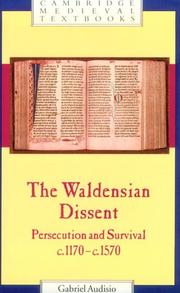
ISBN: 0511053207 1139163930 051115061X 0511017189 9780511017186 0511037961 9780511037962 0521550297 9780521550291 0521559847 9780521559843 9781139163934 9780511053207 Year: 1999 Publisher: Cambridge Cambridge University Press
Abstract | Keywords | Export | Availability | Bookmark
 Loading...
Loading...Choose an application
- Reference Manager
- EndNote
- RefWorks (Direct export to RefWorks)
The Poor of Lyons, whom their detractors called 'Waldensians' - after the name of their founder Waldo (or Vaudès) - first emerged around 1170 and formed in common with other groups of the period a sect which embraced evangelism, prophecy and poverty. By challenging their prohibition by the lay clergy, and by following the Scripture to the last letter, they suffered excommunication and were condemned as heretics. Forced underground and dispersed widely, they nevertheless managed to maintain contact across Europe, through an established network of itinerant preachers, in Provence and Dauphiné, Calabria and Piedmont, Austria and Bohemia, Pomerania, Brandenburg, Silesia and beyond. The Poor of Lyons constituted the only medieval heresy to have survived to the dawn of the so-called 'modern' period. Their tale of simple devotion mixed with a fierce tenacity serves to illuminate aspects of religious belief that have persisted to the present day. This book was first published in 1999.
Waldenses. --- Valdenses --- Valdenští --- Valdesi --- Vallenses --- Vaudois --- Waldensians --- Christian sects --- Humiliati --- Christian church history --- anno 1200-1499 --- anno 1100-1199 --- anno 1500-1599 --- Arts and Humanities --- History
Book
ISBN: 1787444236 1903153867 Year: 2019 Publisher: York : York Medieval Press,
Abstract | Keywords | Export | Availability | Bookmark
 Loading...
Loading...Choose an application
- Reference Manager
- EndNote
- RefWorks (Direct export to RefWorks)
First major survey of the German inquisitor Petrus Zwicker, one of the most significant figures in the repression of heresy.
Inquisition --- Waldenses --- Valdenses --- Valdenští --- Valdesi --- Vallenses --- Vaudois --- Waldensians --- Christian sects --- Humiliati --- Holy Office --- Autos-da-fé --- History. --- Zwicker, Petrus, --- Heresy. --- heterodoxy. --- inquisition. --- religion.
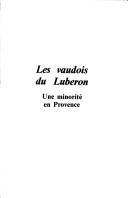
ISBN: 2950067905 9782950067906 Year: 1984 Publisher: s.l. Association d'Etudes Vaudoises et Historiques du Lubéron
Abstract | Keywords | Export | Availability | Bookmark
 Loading...
Loading...Choose an application
- Reference Manager
- EndNote
- RefWorks (Direct export to RefWorks)
Waldenses --- History --- Lubéron Mountains (France) --- Church history --- -Valdenses --- Valdenští --- Valdesi --- Vallenses --- Vaudois --- Waldensians --- Christian sects --- Humiliati --- -History --- Valdenses --- Lébéron (France) --- Montagne du Lubéron (France) --- Montagnes du Lubéron (France) --- Church history. --- Waldenses - France - Lubéron Mountains - History --- Lubéron Mountains (France) - Church history
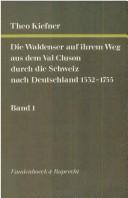
ISBN: 3525553749 352587314X 9783525873144 9783525553749 Year: 1980 Publisher: Göttingen Vandenhoeck und Ruprecht
Abstract | Keywords | Export | Availability | Bookmark
 Loading...
Loading...Choose an application
- Reference Manager
- EndNote
- RefWorks (Direct export to RefWorks)
Waldenses --- 284.42 --- Valdenses --- Valdenští --- Valdesi --- Vallenses --- Vaudois --- Waldensians --- Christian sects --- Humiliati --- Waldenzen. Leonisten. Pauvres de Lyon. Arnoldisten. Les Barbus. Siscidenses. Chiesa evangelica Valdese --- 284.42 Waldenzen. Leonisten. Pauvres de Lyon. Arnoldisten. Les Barbus. Siscidenses. Chiesa evangelica Valdese
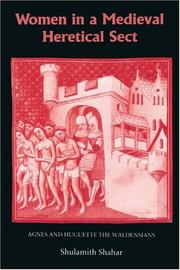
ISBN: 1280544767 9786610544769 1846150124 0851158153 0585443548 Year: 2001 Publisher: Woodbridge, Suffolk, UK ; Rochester, NY : Boydell Press,
Abstract | Keywords | Export | Availability | Bookmark
 Loading...
Loading...Choose an application
- Reference Manager
- EndNote
- RefWorks (Direct export to RefWorks)
Agnes and Huguette were two Waldensian women who were interrogated by the inquisitional court of Pamiers, in southern France, in 1319 and subsequently burnt at the stake for their heretical beliefs. Shahar uses the records of their inquisition as a basis for an examination of the Waldensian sect's attitude towards its women members, and their role within the sect, comparing their lives with women in the Catholic church and in other sects. She finds that in a persecuted voluntary group such as the Waldensians, gender was largely immaterial, subordinate to the fervent religious commitment of the members; nor did the court of inquisition distinguish between male and female, subjecting heretics of either sex to the same horrible punishment.
This is the first book-length treatment of women Waldensians, who have been almost written out of studies of the sect, but are here shown to have played a full role within it. It throws light on women and gender in medieval society as well as on one of the main heretical movements in France in the early fourteenth century.
SHULAMITH SHAHAR is Professor Emeritus of Medieval History, Tel Aviv University.
Waldenses. --- Women in Christianity --- Christianity --- Valdenses --- Valdenští --- Valdesi --- Vallenses --- Vaudois --- Waldensians --- Christian sects --- Humiliati --- History --- Francou, Agnes, --- Huguette, --- Côte, Huguette de la, --- De La Côte, Huguette, --- La Côte, Huguette de, --- Agnes Francou, --- feminism.
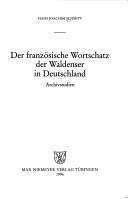
ISBN: 3484522658 3110931079 9783484522657 Year: 1996 Volume: 265 Publisher: Tübingen : Max Niemeyer,
Abstract | Keywords | Export | Availability | Bookmark
 Loading...
Loading...Choose an application
- Reference Manager
- EndNote
- RefWorks (Direct export to RefWorks)
Religiöse Intoleranz vertrieb in den beiden letzten Jahrzehnten des 17. Jahrhunderts mehrere Tausend Waldenser aus dem damals französischen Val Cluson (Chisonetal) in den Kottischen Alpen, später auch aus dem angrenzenden Herzogtum Savoyen, wo sie vorübergehend Zuflucht gefunden hatten. Sie zogen 1685/86 bzw. 1698/99 über die Schweiz nach Südwestdeutschland, insbesondere nach Württemberg und Hessen. Dort wurden sie von einigen protestantischen Fürsten aufgenommen und meist in eigenen Kolonien angesiedelt. Infolge dieser Ereignisse entstanden in den Aufnahmeländern, aber auch in der Schweiz und den Niederlanden (sie unterstützten die Niederlassung diplomatisch und finanziell) große Mengen französischsprachiger Akten, die die dortigen Archive füllen. Sie wurden bisher noch kaum auf ihren Beitrag zur galloromanischen Lexikographie untersucht. Ziel der vorliegenden Arbeit ist es, diese Lücke zu schließen. Zu diesem Zweck wurden rund 1000 Archivdokumente aller Art aus den Jahren 1685 bis 1735/40 ausgewertet. Dabei kamen sowohl korpusspezifische als auch die galloromanische Lexikographie im allgemeinen interessierende Befunde zutage. Sie wurden systematisch mit den im FEW und anderen Quellen verfügbaren Informationen verglichen. Spezifisch sind u.a. eine Reihe okzitanischer Dialektalismen, die die Flüchtlinge aus der Heimat mitbrachten, ferner einige Helvetismen, welche die engen religiösen Beziehungen zur Suisse Romande, vor allem Genf, spiegeln. Auch der z.T. altertümliche Wortschatz hängt wohl mit der Herkunft der Siedler aus einem Randgebiet des französischen Sprachraumes zusammen, das durch die von Paris ausgehende Sprachlenkung kaum berührt wurde. Der allgemein-lexikographische Ertrag umfaßt eine große Zahl chronologischer, semantischer und sonstiger Fakten, die über 500 Lexeme bzw. noch weit mehr zugehörige lexikalische Erscheinungen (Bedeutungen, Syntagmen usw.) betreffen. Sie ergänzen und vervollständigen die im FEW und anderen lexikographischen Werken gesammelten Informationen. Insbesondere gelingt es, eine erhebliche Zahl von Erscheinungen nachzuweisen, die, soweit bekannt, bisher noch nirgends bezeugt sind.
Emprunts français. --- -Foreign words and phrases --- Emprunts français. --- German language --- -Waldenses --- -Valdenses --- Valdenští --- Valdesi --- Vallenses --- Vaudois --- Waldensians --- Ashkenazic German language --- Hochdeutsch --- Judaeo-German language (German) --- Judendeutsch language --- Judeo-German language (German) --- Jüdisch-Deutsch language --- Jüdischdeutsch language --- Foreign words and phrases --- -French --- Christian sects --- Humiliati --- Germanic languages --- Waldenses --- French. --- Allemand (Langue) --- Vaudois (Mouvement) --- Valdenses --- French language --- German language - Foreign words and phrases - French. --- Waldenses - Germany. --- FRANCAIS (LANGUE) REGIONAL --- DIALECTOLOGIE FRANCAISE --- FRANCAIS (LANGUE) --- VAUDOIS --- ALLEMAGNE --- HISTOIRE
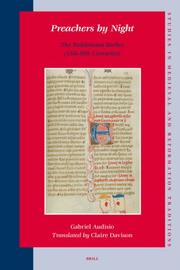
ISSN: 15734188 ISBN: 9789004154544 900415454X 9786611457716 128145771X 9047411315 9789047411314 Year: 2007 Volume: v. 118 Publisher: Leiden ; Boston : Brill,
Abstract | Keywords | Export | Availability | Bookmark
 Loading...
Loading...Choose an application
- Reference Manager
- EndNote
- RefWorks (Direct export to RefWorks)
First inspired by Vaudes in around 1170, the Waldensians formed a religious dissent which survived into the sixteenth century. Respecting the Gospel to the letter, their rejection of oaths, falsehood, the death penalty, purgatory and the intercession of saints marginalized them in the society of the times. Their survival depended on their will to adapt. Organisation became necessary to withstand the pressures of time and space as their community extended across Europe (France, Italy, Switzerland, Germany, Bohemia, Poland). Preachers, called “barbes” in the diaspora’s Romance wing, embodied the ideal lifestyle and unity of their community. This is the story and history of those preachers – celibate, arduous, pious men whose itinerant mission it was to maintain a clandestine but vehement faith.
Waldenses. --- Preaching --- History --- 284.42 --- Valdenses --- Valdenští --- Valdesi --- Vallenses --- Vaudois --- Waldensians --- Christian sects --- Humiliati --- Waldenzen. Leonisten. Pauvres de Lyon. Arnoldisten. Les Barbus. Siscidenses. Chiesa evangelica Valdese --- 284.42 Waldenzen. Leonisten. Pauvres de Lyon. Arnoldisten. Les Barbus. Siscidenses. Chiesa evangelica Valdese --- Waldenses --- Verkondiging. --- Waldenzen. --- Preaching - History - Middle Ages, 600-1500.
Book
ISBN: 9783775257596 3775257594 Year: 2008 Volume: 59. Publisher: Hannover Hahn
Abstract | Keywords | Export | Availability | Bookmark
 Loading...
Loading...Choose an application
- Reference Manager
- EndNote
- RefWorks (Direct export to RefWorks)
Christian heresies --- Witchcraft --- Waldenses --- Albigenses --- Hérésies chrétiennes --- Sorcellerie --- Vaudois (Mouvement) --- Cathares --- History --- Histoire --- Heresy --- Hérésies chrétiennes --- Valdenses --- Valdenští --- Valdesi --- Vallenses --- Vaudois --- Waldensians --- Christian sects --- Humiliati --- Heresies --- Offenses against religion --- Apostasy --- Heresy - History --- Witchcraft - History --- Waldenses - History --- Hérésie --- Vaudois (mouvement)
| Listing 1 - 10 of 20 | << page >> |
Sort by
|

 Search
Search Feedback
Feedback About UniCat
About UniCat  Help
Help News
News